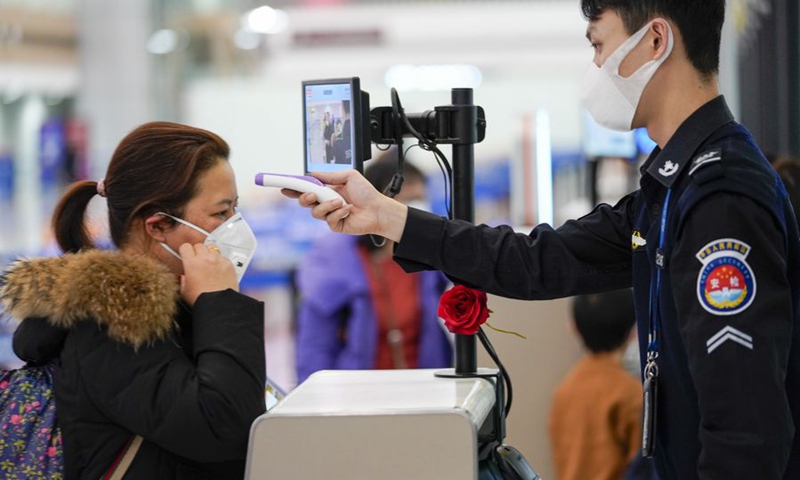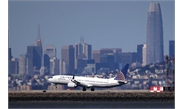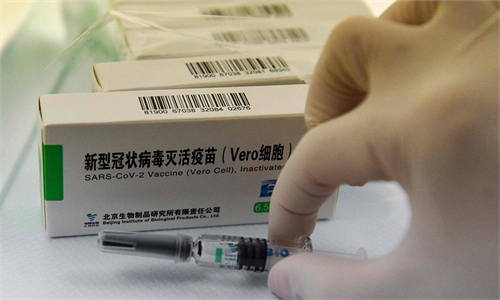Personnel exchange boom expected as US universities recognize Chinese vaccine: experts

A security staff member checks a passenger's temperature at Chongqing Jiangbei International Airport in Southwest China's Chongqing, Jan. 26, 2020. File photo: Xinhua
Several famous US universities, including Harvard and Columbia, have recognized the COVID-19 vaccine produced by China's Sinopharm following the approval of the vaccine's emergency use by the World Health Organization (WHO).
Chinese experts said that the notice, which was issued by the Chinese Consulate in New York on Wednesday, will facilitate travel and academic exchanges between the two countries.
Chinese students who have already taken the Sinopharm vaccine no longer need to take COVID-19 shots in the US when they arrive on campus, said the notice.
The experts predicted that other sectors such as commerce and trade in the US will also gradually accept Chinese vaccines amid growing demand to resume personnel exchanges.
The schools that have recognized Sinopharm's vaccine are Harvard University, Columbia University, New York University, Yale University, Dartmouth College, the University of Rochester and Lafayette College, according to the announcement.
As more schools are expected to follow suit, the new policy has come as relief to Chinese students who plan to return to campus in the US this fall and were inoculated with Sinopharm's vaccine.
A Chinese student surnamed Chen, who has been admitted to an MBA program at the University of Dartmouth this year and plans to leave for the US in September, shared her delight upon learning the news.
She took the Sinopharm vaccine in March and was disappointed by the school's policy at that time, when she was informed that Sinopharm shots could not be accepted, she told the Global Times on Wednesday.
According to the updated policy of Chen's university, students are considered fully vaccinated if they are injected with FDA-approved vaccines or vaccines that have received Emergency Use Listing by the WHO, which means Sinopharm is included.
Chinese students accounted for 35 percent of international students in the US in the 2019-20 school year, according to the International Education Exchange, nearly twice as many as the second-highest, being students from India.
Normally, other US universities will follow the lead of top schools, Liu Shuangtao, CEO of Perfecting Education, an educational consulting agency for students in the US, told the Global Times on Wednesday.
"Their [US universities] recognition of Chinese vaccines can remove one of the major concerns for Chinese students going to study in the country amid the pandemic," Liu said.
Although the uncertainty of the epidemic remains, for Chinese students in the US, resuming offline classes can definitely be foreseen in the fall term, Liu said, noting that the agency has seen an increasing number of appointments after the US Embassy and consulates opened visa applications for Chinese students.
The Global Times learned on Wednesday from Chinese online flight booking platform Ctrip.com that ticket prices for direct flights from Shanghai to San Francisco in July and August, the peak season for students returning to school, skyrocketed from 6,000 yuan ($931) to 28,000 yuan ($4,348).
Data showed that fares and demand for China-US air routes surged fivefold just one day after the US eased travel bans on Chinese students. Some direct flights from China's major cities to the US during the peak season are already sold out.
Analysts forecast that more flights between the two countries could be arranged due to surging demand.
The US Embassy and consulates in China opened visa appointments for Chinese students on May 4, after the US announced easing of travel restrictions for foreign students.
In late April, US authorities eased travel bans for Chinese students, announcing that those with academic programs beginning August 1 or later can enter the US no earlier than 30 days before the start of their academic activities.
The ensuing signs of academic exchange resumption can be seen as a positive signal from the White House on bilateral personnel exchanges, Chinese experts on foreign affairs noted.
Diao Daming, an associate professor at the Renmin University of China in Beijing, told the Global Times on Wednesday that after US President Joe Biden took office, he has been making a series of attempts to gradually open up personnel exchanges with China, especially in the education domain.
This is in line with the competitive but non-confrontational attitudes adopted by the current administration, to dial down the Cold War mentality and take a more neutral stance on bilateral relations regarding non-essential interactions, Diao said.
Adding to the moderated tone of the White House, a number of seriously affected industries suppressed by the previous US administration, such as commerce and trade, education and tourism, are appealing for the liberalization of exchanges with China in the hope of reviving their vitality, observers noted.
But a Beijing-based immunologist, who requested anonymity, believed that "manufacturing of Chinese vaccines in the US will still be difficult," and the approval will mainly be limited to personnel exchanges.
Diao added that mutual vaccine recognition between the two countries may be extended to various fields, "but Biden will not loosen up on any key, sensitive areas such as the high-tech industry."
Diao stressed that many uncertainties remain concerning the further relaxation of China policy, holding a cautiously optimistic view on the Wednesday development. "Biden emphasizes value-oriented policies, and China must stay cautious," he warned.


